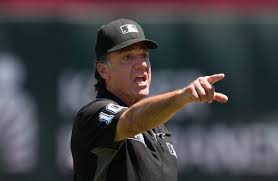
Imago
Phil Cuzzi. credit: crossingbroad.com

Imago
Phil Cuzzi. credit: crossingbroad.com
It was not just a road loss. It was a game that burst open a deeper frustration, one that has been steaming under the surface all season. When the Phillies took the field at Oracle Park, they already knew the challenge. They hardly even win there, and this time, things might finally lean in their favor. Cristopher Sánchez was electric. Seven innings, eight strikeouts, barely a blemish. It was the kind of performance that deserved a headline, not a footnote.
Watch What’s Trending Now!
But that storyline got skyjacked in the eighth inning.
As the games were on the line, all eyes shifted to home plate and not because of the batter. Umpire Phil Cuzzi suddenly became the center point. First came a strikeout call on Bryce Harper, who missed the zone. Then, in the bottom half of the inning, came the emotional explosion. With Matt Chapman at the plate, Cuzzi missed not one, not two, but three clear strikes, giving Chapman an extra life. The result? A single that changed the go-ahead run into scoring position and lit the fuse for a Giants rally.
ADVERTISEMENT
From there, things twirled fast. Phillies reliever Orion Kerkering, clearly thrown off balance by the chaos, hit the next batter. Bases loaded. The next play was not a double play; it was an RBI fielder’s choice. Then came a rushed throw from Harper at first, and boom: a 3-1 Giants lead. One at-bat should not define a game, but in this case, it tipped the scales in a way that the fanbase and analysts could not ignore.
And the stats did not help Cuzzi’s case. As per Umpire Auditor: “Umpire Phil Cuzzi had a rough 8th inning in the Giants-Phillies game. He made two bad calls to Bryce Harper and then gifted Matt Chapman a 2nd, 3rd, and 4th life. Instead of striking out, Chapman singled and moved the winning run into scoring position. Cuzzi missed 20 calls in the game.”
Umpire Phil Cuzzi had a rough 8th inning in the Giants Phillies game.
He made two bad calls to Bryce Harper and then gifted Matt Chapman a 2nd, 3rd, and 4th life in the bottom half of the inning.
Instead of striking out, Chapman singled, and moved the winning run into scoring… pic.twitter.com/Sfeo7ZwNGB
— Umpire Auditor (@UmpireAuditor) July 8, 2025
ADVERTISEMENT
Twenty missed calls in one game? That is not just a bad night; that is a collapse in judgment. Phillies’ Harper explained his side. “I feel like anytime I complain it’s pretty obvious. He knows he missed them. Sometimes that happens. Umpire took over the game. I couldn’t say much more, I didn’t want to. I barely said anything to him when I walked off the first time on the strike three that was up. I respect Phil, I like Phil a lot. But obviously that doesn’t help us in that situation. He’s got to do better.”
What makes the backlash much stronger is that this was not just about one team losing. It was about how the strike zone completely lost structure, and how much power umpires still hold over momentum, confidence, and finally, wins and losses. When a pitcher delivers and the offense grinds out chances, it is heartbreaking to see the work undone by invisible margins.
ADVERTISEMENT
So, the question being asked now is pure, simple: How much longer will MLB let this go on? When stars are losing trust and supporters are keeping score on umpire mistakes, the league can not keep dodging accountability. Monday night in San Francisco could have been the tipping point, not just for the Phillies, but for the game’s integrity as a whole.
While the controversy inside Oracle Park hit the fuse, the explosion happened online. Fans did not just vent, they released a surge of frustration that revealed a growing, league-wide mistrust in MLB umpiring. And judging by their tone, patience is wearing dangerously thin.
ADVERTISEMENT
Fan outrage hits a peak as umpiring standards face heavy fire
One fan did not just mince words: “All we gotta do? Fire…s—–…umps. That’s LITERALLY it.” The suggestion? Treat umpires likewise as the stars; if their performance falls, send them down. “Making s—– calls? You get sent back down to the minors just like the players do,” the fan added. It is a simple but convincing idea that is echoed widely: accountability through demotion. With Phil Cuzzi missing 20 calls in one single game, it is hard to argue against the sentiment. In a league obsessed with performance metrics for athletes, why are umpires left untarnished?
Another fan took things a step ahead, hinting at something more menacing: “They have been awful this year across the board. Should check these dudes for gambling on games.” Now, that might sound extreme, until you look at the data. As of June 2025, umpires had missed over 4,200 calls, including 202 strikeouts, as per the data from Umpire Auditor. That is not just bad luck. It is a whole new trend. When blown calls swing momentum and postseason races, suspicion is bound to follow. Particularly in a world where scandals in other leagues have taught fans not to blindly trust the game officials.
Top Stories
Max Scherzer’s “Unfinished Business” Sends Clear Signal to Blue Jays After Honest Plea to All 30 MLB Teams
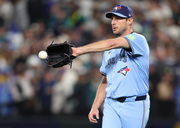
Tarik Skubal’s Detroit Exit All but Confirmed as Tigers Poised to Lose $13M Dispute, Per Insider
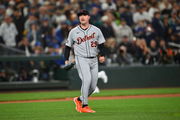
Carlos Mendoza Sends Clear Message to Bo Bichette After Ex-Blue Jays Star’s Heartfelt Note to Vladimir Guerrero Jr.

Pirates to Bolster Offense With $42M Powerhouse as Andrew McCutchen Hits Point of No Return- Report
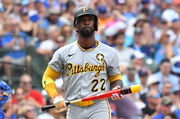
Derek Jeter Makes Feelings Known About Hal Steinbrenner’s Ownership as Bronx Fans Give Up on Yankees
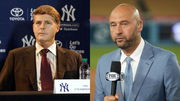
A third reaction pointed out the imbalance on display: “20 calls is beyond egregious… I had 17, with 13 going against the Phillies. Wondering now which team benefited from the other 3.” That is not just about a high volume of errors; it was about who the errors helped. According to UmpScorecards, Phil Cuzzi entered the game with a 94.03% correct call rate, a figure already below elite standards. Yet fans feel like what happened on Monday went beyond human error; it felt targeted. And when 13 of those missed calls hurt the same team, fans started to do their own calculations.
ADVERTISEMENT
Then came a more long-term issue: “He’s the worst – every MLB ump should be forced to retire at 55.” Harsh? Maybe. But it reflects an age-old frustration. Phil Cuzzi is 69 years old and has been a full-time umpire since 2000. That is 25 years behind the plate and a long trail of missed calls to go along with it. While experience is valuable, fans argue that the physical demands of the job, especially in the pitch clock era, call for fresher eyes and sharper reactions instead.
And ultimately, one fan tied it all together by addressing MLB’s inconsistent enforcement: “Remember people… MLB is investigating Guardians pitcher Luis Ortiz over two pitches, yet these obviously dirty umps are never investigated.” That is not just a hot take; it is a grounded fact. Ortiz was placed on non-disciplinary leave while the league looked into a possible gambling issue tied to two specific pitches. But when it comes to umpires, even those who miss 20 calls in a single night, there is no visible follow-up, no public investigation, no repercussions.
This is not just about Phil Cuzzi anymore. It is regarding growing distrust, in the calls, in the silence, and in the system as well. Fans want total transparency, action, and a league that polices its umpires as strictly as it does its players. Because presently, that balance feels completely off track.
ADVERTISEMENT
`
ADVERTISEMENT
ADVERTISEMENT
ADVERTISEMENT